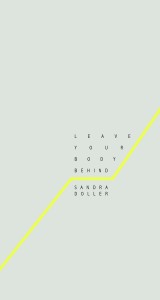Leave Your Body Behind
By Sandra Doller
134 pp. Les Figues Press, $17.00
Gertrude Stein writes to the effect that writing is synonymous with existing and that language is as breathing. Everything has a lot to do with everything. Nothing is disconnected, even in its frailty, even its (mis) or (dis)connection, the most tenuous. Sandra Doller, in Leave Your Body Behind, cites Stein before we enter her text, “Everything has a lot to do with poetry. Everything has a lot to do with prose.” Complete sentences with full stops. Declarative.
The aphoristic text alternates between prose blocks, most lasting a page or two, and quotations and citations from other thinkers, among them Harryette Mullen, Yoko Ono, and Roland Barthes. Performatively reworking both the memory of the writer and the memory of the language, it coheres into a not-quite-memoir, not-quite-essay of constant, quick insight.
In Leave Your Body Behind, the existing and breathing has to do with leaving behind the sinewy synapses of what you think you know, your and this molten body, the lava corpse of understanding writing and how to get inside language. It’s about, as Doller says, getting inside something enormous, something ancient, something before you and after you. She writes “. . . did you sign your life over to something enormous.” Declarative. Full stop.
Leave Your Body Behind forces the reader to sign life away to something bigger, something you always knew you had with you but that was too fussy in the body to grasp. Here is the wide birth of your language pocket, here is the universe. You live here [points to middle, smallest circle], now how do you feel? Small? Indeed. Leave Your Body Behind only makes you feel small in that you realize the immensity of where your language and understanding is situated and my, what a large and infinite space.
Throughout the text, the sensation of leaving permeates, and you are forced to weave in and out of the closest relationships: jokes and punch lines, advice and prayer, direction and lamentation, celebration and loss, the inundation of the past, present and future, “Growing old growing old growing old yawn,” Doller says.
If we keep repeating our language, keep processing all that comes to us, will we make sense from our understanding of memory? Will we hold on to what is important? Doller writes, “So many pastimes, so little past.” She writes, “This is how we go. We go solidly. We go goldly. We go awayward. Warward.” In this liminal space, the language lives to help us live. This idea of existing that Stein puts forward. And like Stein, Doller understands that without language, without living inside of it, our breathing and life is no longer. How we catch our breath depends on our bodies. And so, if we leave our body behind, how do we catch our breath? Doller says “It is and isn’t that difficult” and yes, that is right; memory and language and body, and living and breathing, it is and is not that difficult. To be a human, humanity.
“The lack of it has to do with everybody’s times and everybody’s lack of it.” Prose and poetry, memoir and essay and novel and poem, memory and language, how these things marry and where they divorce in Leave Your Body Behind seem secondary to the importance of understanding how to breathe and how to exist. “The difficulty of telling a story is never said,” Doller writes, and how to exist and breathe with that story is even more sacred and comes with even more suffering, far beyond the ways in which genre is understood or categorized. What Doller coexists with and embodies in Leave Your Body Behind shatters those categorizations and boundaries to bring an entire new level of how, even, a book is read and understood, “That was the first page of the best of my life.”
If I can leave with one word. Or words. One sentence. Or sentences. One paragraph. Or paragraphs. Pages, or page. If I can leave with the first page or the best page. If I can sit and not leave a while longer and live in this language, I will be able to breathe, and so will you. This text is a wake-up call. Dollar says, “It’s only a matter of “time” before the alarm goes off.” Only a matter of past, present, and future, before you understand here is a text that will force you to exist, coexist, and breathe.


